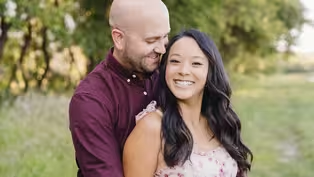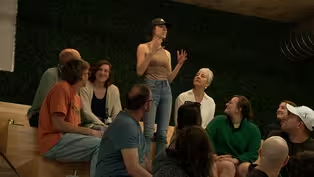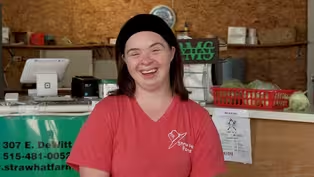
Des Moines Refugee Support
Clip: Season 1 Episode 106 | 6m 24sVideo has Closed Captions
Many refugees struggle managing their trauma while retaining vital parts of their culture.
Many refugees struggle managing their trauma while retaining vital parts of their culture. Des Moines Refugee Support is a secular, fully-volunteer group that helps refugees and immigrant families get settled and establish their new lives in Iowa.
Problems playing video? | Closed Captioning Feedback
Problems playing video? | Closed Captioning Feedback
Iowa Life is a local public television program presented by Iowa PBS

Des Moines Refugee Support
Clip: Season 1 Episode 106 | 6m 24sVideo has Closed Captions
Many refugees struggle managing their trauma while retaining vital parts of their culture. Des Moines Refugee Support is a secular, fully-volunteer group that helps refugees and immigrant families get settled and establish their new lives in Iowa.
Problems playing video? | Closed Captioning Feedback
How to Watch Iowa Life
Iowa Life is available to stream on pbs.org and the free PBS App, available on iPhone, Apple TV, Android TV, Android smartphones, Amazon Fire TV, Amazon Fire Tablet, Roku, Samsung Smart TV, and Vizio.
Providing Support for PBS.org
Learn Moreabout PBS online sponsorshipIn 2016 - 17 is when a lot of families from Congo came also and a lot of families from Syria came.
And then 2021, a thousand Afghans started showing up in Des Moines.
And so we stepped in where we could.
And, you know, we had this entire basement set up as a store so that people could come and take what they needed for their houses.
We had people going grocery shopping and worked on helping people find jobs, getting kids signed up for school, all kinds of stuff.
So Des Moines Refugees support is here to fill in the gaps for refugees that come to live in Iowa.
Whatever they say that they want to take with it, you're going to help them walk it out.
You're going to take it.
So I am the only employee.
Everyone else is a volunteer.
We have like a private little Facebook group.
And that's where people will go.
And, you know, somebody goes, hey, you know, this person needs a ride, this person, whatever.
And there's over a thousand people in that group.
Then I also have, you know, several text groups of people that I'm just like desperately, hey, please, somebody needs to take this person on this day blah blah blah.
I mean, sometimes it still ends up being my mom.
I have five other board members, but all as volunteers.
I need you to get a single file line and go down the sidewalk.
So the refugee story varies a lot, but when they get here, they're most of them need to learn a lot of English.
You know, they're showing up in this new place.
They don't know what's going on.
Their life before this was either a refugee camp or war.
A lot of the women that are here are like just old enough that they didn't get to go to school, really.
So they don't have a lot of education.
And then there's just I mean, there's a lot of trauma.
Right.
And, you know, especially for the Afghans, like these little kids, like their whole life has been war and then like suddenly leaving their country and leaving, you know, their grandparents probably, and just leaving everything that they know.
So it was chaos when the Afghan government collapsed.
Everyone was trying to get out because Taliban took control of Afghanistan.
And we decided, my and my other fellow soldiers to go to the Kabul airport and find a way to go to be evacuated from Afghanistan to the other country.
I was heartbroken, injured, tired, so I decided to go somewhere which don't remind my past.
They asked me, Where do you want to go?
So I saw the Iowa in the middle and I never heard that name from any Afghan.
I said, I want to go to Iowa.
I came to the Iowa on October 7 stayed in Urbandale Hotel, and after two days, when I wake up in the morning, came out of the hotel and I saw some Afghan the people in Afghan dress they were walking around the hotel.
So I went close to them and talked to them and they said like, yeah, we cannot speak English.
We are looking for like a food.
We are looking for buy things for spring and I decided again to start working with the Afghans.
If I could lead a battalion in Afghanistan why I can not help them here in America.
So then I came up with the idea of Afghan partners and as a nonprofit organization in June 2022.
And so we knew that Safi was the perfect person to be in charge of that because he knows every single Afghan in this city.
He has all of their phone numbers and then he's done a bunch of other things just, you know, to kind of try to bring the community together.
You know, there's a line between like, how can I help you and how can I get you to a point where, like, you are on your own?
And what it is, is it's people from Afghanistan helping people from Afghanistan, people from southeast Asia, helping people from Southeast Asia.
There's a lot of assistance out there.
But knowing how to get it and keep it is it's a lot, especially when you don't speak or read the language.
There's over 100 languages spoken in Des Moines public Schools.
There's a ton of people that are from other countries that have come to Des Moines and the kids need something to do, right, because they are going to school and then they're going home and they have nothing to do, right.
And so I was like, okay, they all love soccer.
You know, the joke is that the U.S. soccer is a sport.
To the rest of the world it's a religion.
Last year, Alison's group did 55 kids.
This year it's over 80.
He was patient.
And this is everything you want as a defender.
I think on my select team right now, I was counting up.
We speak somewhere in the neighborhood of nine different languages.
The club here wanted to focus on kids who can't afford the transportation and who can't afford the fees and can't afford the equipment.
This is a place for them to come together and, you know, to do something that they're truly love and truly passionate about.
So it's immense.
Everything that we take for granted is of a job and transportation and safety net.
These kids are living without it.
And soccer can be a vehicle to college or to some sort of degree.
It's some sort of employment down the line.
That's that's kind of the dream that I think about.
It's crazy.
Like, I will get messages on our Facebook that say, Oh, I just started following your group.
I didn't know that there were refugees in Iowa.
What?
What?
It's shocking to me.
They're just like people like just like us.
And they just they're like, trying to make it.
Like.
Yes, exactly.
Like, they're just people.
They're just trying to do their thing.
And they also have just have this background of trauma and, you know, other things.
And so they just might need a little extra help, a little extra love, extra friendship from people that already live here.
Video has Closed Captions
Clip: S1 Ep106 | 6m 17s | Meet a young couple whose love story is one for the history books. (6m 17s)
Video has Closed Captions
Clip: S1 Ep106 | 4m 58s | The lyceum movement is a revival of an old tradition of public learning. (4m 58s)
Video has Closed Captions
Clip: S1 Ep106 | 6m 5s | Marissa Schletzbaum, who has Down Syndrome, is a Special Olympian from Pleasantville, Iowa. (6m 5s)
Providing Support for PBS.org
Learn Moreabout PBS online sponsorshipSupport for PBS provided by:
Iowa Life is a local public television program presented by Iowa PBS
















